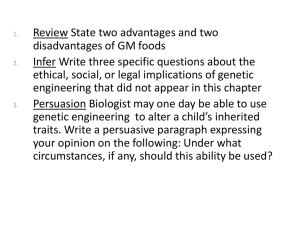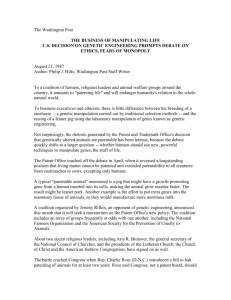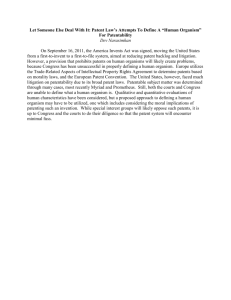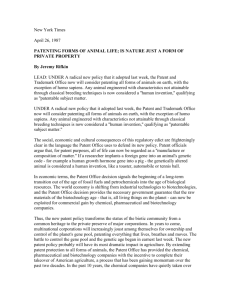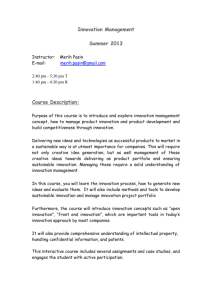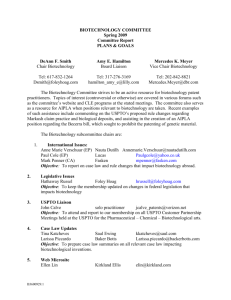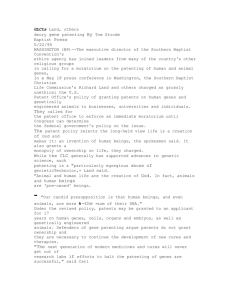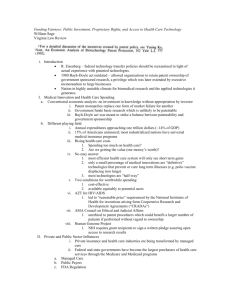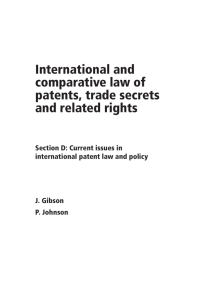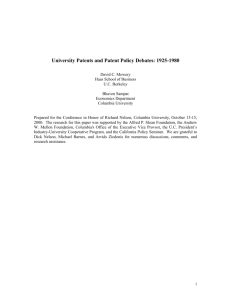Life Patents: Doubts Are Registering
advertisement
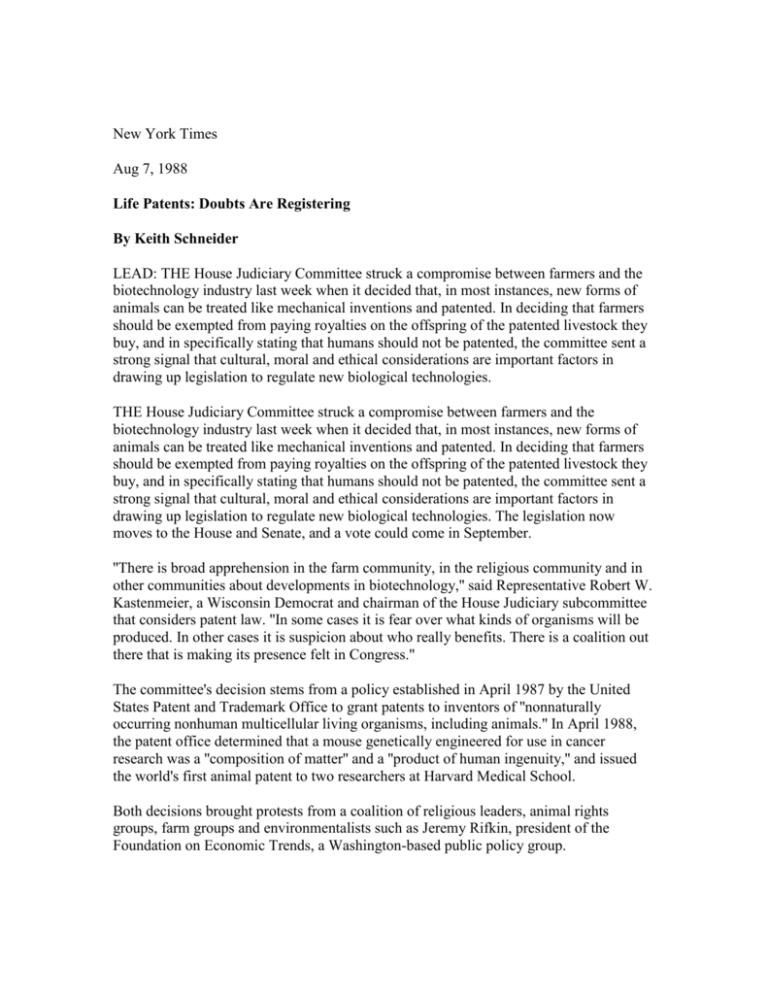
New York Times Aug 7, 1988 Life Patents: Doubts Are Registering By Keith Schneider LEAD: THE House Judiciary Committee struck a compromise between farmers and the biotechnology industry last week when it decided that, in most instances, new forms of animals can be treated like mechanical inventions and patented. In deciding that farmers should be exempted from paying royalties on the offspring of the patented livestock they buy, and in specifically stating that humans should not be patented, the committee sent a strong signal that cultural, moral and ethical considerations are important factors in drawing up legislation to regulate new biological technologies. THE House Judiciary Committee struck a compromise between farmers and the biotechnology industry last week when it decided that, in most instances, new forms of animals can be treated like mechanical inventions and patented. In deciding that farmers should be exempted from paying royalties on the offspring of the patented livestock they buy, and in specifically stating that humans should not be patented, the committee sent a strong signal that cultural, moral and ethical considerations are important factors in drawing up legislation to regulate new biological technologies. The legislation now moves to the House and Senate, and a vote could come in September. ''There is broad apprehension in the farm community, in the religious community and in other communities about developments in biotechnology,'' said Representative Robert W. Kastenmeier, a Wisconsin Democrat and chairman of the House Judiciary subcommittee that considers patent law. ''In some cases it is fear over what kinds of organisms will be produced. In other cases it is suspicion about who really benefits. There is a coalition out there that is making its presence felt in Congress.'' The committee's decision stems from a policy established in April 1987 by the United States Patent and Trademark Office to grant patents to inventors of ''nonnaturally occurring nonhuman multicellular living organisms, including animals.'' In April 1988, the patent office determined that a mouse genetically engineered for use in cancer research was a ''composition of matter'' and a ''product of human ingenuity,'' and issued the world's first animal patent to two researchers at Harvard Medical School. Both decisions brought protests from a coalition of religious leaders, animal rights groups, farm groups and environmentalists such as Jeremy Rifkin, president of the Foundation on Economic Trends, a Washington-based public policy group. ''Patenting higher forms of life will essentially allow multinational corporations to literally own and control entire animal gene pools, from apes to insects,'' said Mr. Rifkin. ''It will reduce all animals to matter for manipulation. And it enables companies to define the genetic blueprints of all living things as their own property. It is a profound change in how we regard animals.'' From Plants to Animals Biotechnology industry executives and officials of the Patent Office, however, believe patenting animals, such as pigs that grow faster and leaner, is not a leap into new territory. In 1930 Congress passed the Plant Patent Act, enabling breeders of trees, roses and other plants that reproduce through cuttings to protect their developments. In 1970, Congress extended protection to new varieties of wheat, corn and other crops that reproduce through seeds. And in 1980, by a 5-to-4 vote, the Supreme Court ruled that microorganisms transformed through artificial manipulation of their genetic codes could also be patented. ''Patenting animals is a logical extension of previous policies,'' said Donald J. Quigg, Assistant Secretary of Commerce and Commissioner of Patents. The conflict over patenting animals and other developments in biotechnology, however, is far from resolved. Many farmers, who worry that animal patents might enable large companies to control livestock agriculture, supported a bill introduced by Representative Charlie Rose, Democrat of North Carolina, that would have prevented the patent office from issuing animal patents for two years. Last week, the Judiciary Committee defeated Mr. Rose's legislation. Farmers also support the legislation that exempts them from having to pay royalties on the offspring of patented livestock. Royalty payments, they argue, would be an expensive departure from usual practices in which farmers pay breeders for adult animals or for stud services, and then are free to produce and sell offspring without additional fees. Biotechnology industry executives and many molecular biologists believe such concerns are misplaced. Genetic engineering, they say, will help farmers raise productivity, and big and small farmers will benefit equally. And they argue that biotechnology companies are entitled to royalties from inventions that in many cases cost millions of dollars to develop. The battle over animal patenting now moves to the Federal court in San Francisco where several animal welfare organizations and a Wisconsin farm group brought suit last month against the patent office, contending that patenting animals is illegal. The patent office has not responded to the suit. ''Congress never intended that animals should be viewed as compositions of matter under the patent law,'' said Steven M. Wise, an attorney from Boston and president of the Animal Legal Defense Fund, an animal welfare group. ''Animals are sentient, have consciousness, and are far above mere compositions of matter.''
